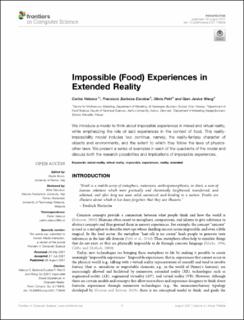| dc.contributor.author | Velasco, Carlos | |
| dc.contributor.author | Barbosa Escobar, Francisco | |
| dc.contributor.author | Petit, Olivia | |
| dc.contributor.author | Wang, Qian Janice | |
| dc.date.accessioned | 2023-01-23T09:49:25Z | |
| dc.date.available | 2023-01-23T09:49:25Z | |
| dc.date.created | 2021-07-28T10:34:32Z | |
| dc.date.issued | 2021 | |
| dc.identifier.issn | 2624-9898 | |
| dc.identifier.uri | https://hdl.handle.net/11250/3045210 | |
| dc.description.abstract | We introduce a model to think about impossible experiences in mixed and virtual reality, while emphasizing the role of said experiences in the context of food. This reality-impossibility model includes two continua, namely, the reality-fantasy character of objects and environments, and the extent to which they follow the laws of physics-other laws. We present a series of examples in each of the quadrants of the model and discuss both the research possibilities and implications of impossible experiences. | en_US |
| dc.language.iso | eng | en_US |
| dc.publisher | Frontiers | en_US |
| dc.rights | Navngivelse 4.0 Internasjonal | * |
| dc.rights.uri | http://creativecommons.org/licenses/by/4.0/deed.no | * |
| dc.title | Impossible (food) experiences in extended reality | en_US |
| dc.type | Journal article | en_US |
| dc.type | Peer reviewed | en_US |
| dc.description.version | publishedVersion | en_US |
| dc.rights.holder | The Authors | en_US |
| dc.source.volume | 3 | en_US |
| dc.source.journal | Frontiers in Computer Science | en_US |
| dc.identifier.doi | 10.3389/fcomp.2021.716846 | |
| dc.identifier.cristin | 1922862 | |
| cristin.ispublished | false | |
| cristin.fulltext | original | |
| cristin.qualitycode | 1 | |

